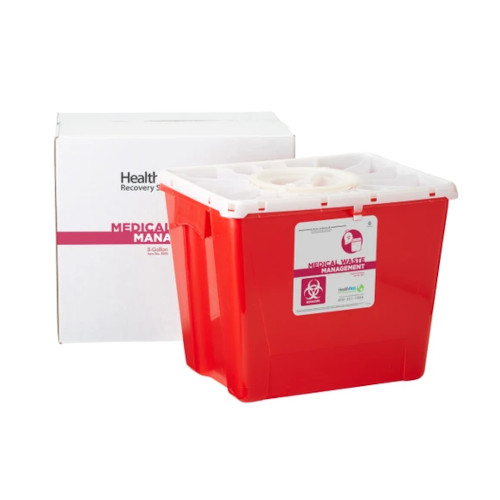Streamlined Solutions: Streamlining Healthcare Methods with Professional Medical Waste Disposal
Streamlined Solutions: Streamlining Healthcare Methods with Professional Medical Waste Disposal
Blog Article
Understanding the Various Kinds of Garbage Disposal Methods
In the realm of waste monitoring, the variety of disposal methods offered today is large and varied, each approach offering a distinct objective in resolving the obstacle of garbage disposal. click here. From recycling methods that aim to provide new life to products, to the detailed procedures of harmful waste monitoring, the landscape of garbage disposal is complex yet important for ecological sustainability. Recognizing the nuances of these various techniques not only clarifies the significance of liable waste administration yet also prompts us to rethink our technique in the direction of garbage disposal in a quickly developing world

Recycling Approaches
Reusing methods are important for sustainable waste administration techniques in both industrial and residential setups. medical waste removal near me. By executing efficient recycling approaches, a substantial amount of waste can be drawn away from garbage dumps, saving natural deposits and decreasing the ecological impact of manufacturing procedures
In residential locations, curbside recycling programs play an essential duty in encouraging families to different recyclable products from general waste. Materials such as paper, plastics, glass, and steels can be sorted and accumulated for handling right into new items, lowering the requirement for basic materials and energy-intensive manufacturing processes.
Industrial facilities likewise depend on reusing approaches to lessen waste generation and promote a round economic climate. By carrying out closed-loop systems, services can recycle materials within their production processes, lowering expenses and environmental footprint. medical waste removal near me. In addition, commercial recycling programs frequently include partnerships with specialized reusing centers to make sure that products are properly arranged, processed, and rehabilitated into the supply chain
Composting Techniques

Aerated fixed pile composting includes blending organic waste products in a huge heap and on a regular basis transforming it to make sure proper aeration. This method is appropriate for smaller-scale operations and houses.
In-vessel composting includes placing natural waste in a shut container with regulated conditions for temperature and oygenation. This method is efficient for managing food waste in city areas. Windrow composting consists of creating long rows of organic waste and routinely turning them to advertise disintegration. This method is generally utilized in agricultural settings.
Landfill Disposal
Land fill disposal is a generally made use of approach for handling waste that can not be recycled or composted. Methane gas, a byproduct of disintegrating organic waste in land fills, is usually collected and used as a source of renewable energy. Efforts to reduce reliance on land fills consist of advertising waste reduction, reusing, and exploring alternative waste disposal techniques to lessen the ecological footprint associated with standard landfill disposal practices.

Waste-to-Energy Incineration
Incineration of waste for power generation is an approach significantly being taken into consideration as an option to standard garbage dump disposal techniques. Waste-to-energy incineration includes the combustion of waste materials at heats, commonly in specialized facilities designed to create electrical energy or warm with the procedure - click here. This strategy not only lowers the quantity of waste that would certainly otherwise be destined for landfills but likewise takes advantage of the warmth produced throughout incineration to create energy
One of the vital advantages of waste-to-energy incineration is its ability to generate electrical power while minimizing the ecological effect compared to traditional landfill disposal approaches. By converting waste right into power, this approach aids in reducing greenhouse gas discharges and dependence on fossil gas for power generation. In addition, waste-to-energy centers are equipped with innovative air pollution control innovations to minimize possible toxic wastes released during the combustion process.
Hazardous Waste Administration

Taking into consideration the crucial importance of responsible waste monitoring practices, especially in the realm of environmental sustainability, the focus currently shifts towards the elaborate domain name of Contaminated materials Monitoring. Contaminated materials positions significant risks to both human health and the environment, demanding specialized handling and disposal strategies. Common examples of dangerous waste include chemicals, batteries, pesticides, and electronic waste.
Hazardous Waste Management involves the recognition, collection, transport, therapy, and disposal of materials deemed possibly hazardous or harmful. This procedure needs adherence to strict guidelines and standards to reduce negative effect on environments and public health and wellness. Different techniques are used in handling contaminated materials, including recycling, safe and secure garbage dumps, encapsulation, and chemical therapy.
Proper Contaminated Materials Monitoring is important for avoiding contamination of dirt, water resources, and air contamination. It is vital for markets, labs, health care centers, and various other generators of unsafe waste to execute robust management methods, training programs, and emergency feedback plans to ensure the risk-free handling and disposal of these products. Failure to handle contaminated materials appropriately can have far-ranging consequences, highlighting the importance of attentive and liable practices in this field.
Final Thought
In conclusion, waste disposal methods play an important role in managing and reducing the impact of waste on the setting. It is important for sectors and people to understand the different waste disposal methods offered and pick the most ideal technique for sustainable waste management.
In the world of waste management, the array of disposal methods offered today is vast and differed, each technique offering an unique function in resolving the difficulty of waste disposal. click here. From reusing techniques that aim to give new life to products, to the elaborate processes of unsafe waste administration, the landscape of waste disposal is complex yet critical for environmental sustainability. Understanding the nuances of these different strategies not just sheds light on the importance of responsible waste administration but additionally motivates us to reconsider our approach towards waste disposal in a swiftly evolving globe
Initiatives to reduce dependence on land fills include advertising waste decrease, recycling, and exploring alternate waste disposal methods to minimize the ecological impact associated with standard landfill disposal methods.
It is my review here important for sectors and people to understand the various waste disposal methods offered and choose the most suitable method for lasting waste administration.
Report this page